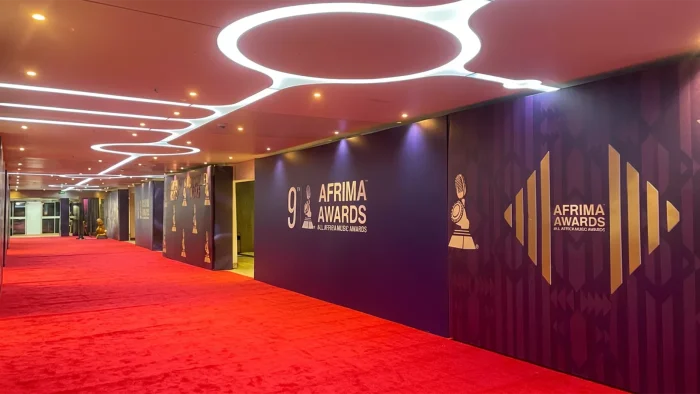- Funke Akindele’s Behind the Scenes crosses ₦2bn, sets new Nollywood record
- With opportunity and access to funds, I still ask why it’s not clicking,” Sharon Adeleke reflects on business success
- 9th AFRIMA finale: Live updates from red carpet to final win
- Ogun police investigates alleged assault case of singer portable while in custody

Prior to the advent of digital music streaming, Nigeria’s music industry was heavily reliant on traditional ways of music consumption – CDs, DVDs and cassette tapes – just as in other African countries. These traditional channels coupled with the privatization of radio and TV offered Nigerian artists and record labels avenues to distribute and disseminate their music to consumers.
[ad]
However, with piracy plaguing developed music markets in the early 2000s and consequently other emerging music markets, thus affecting CD sales globally and threatening the future of the recording industry, the adoption of music streaming became a panacea to the ailing industry. This shift is still ongoing with global streaming platforms presently active in the emerging music market of Africa of which Nigeria holds great value and potential..
Looking back at the nascent stage of music streaming in Nigeria, the likes of iROKING and Spinlet were the pioneer streaming platforms that began to test music streaming as a service model in 2010. However, with the complexities of the music scene, consumer dynamics and the prevalence of free music download websites, those two platforms had to fold up. It was only after Boomplay emerged that the culture of music streaming became an established means of music consumption.
Years down the line, music streaming in Nigeria has become another revenue source for artists and a proponent of the new frontier of the digital music business. It’s only right to look at Boomplay’s operations in Nigeria: the factors that influenced its emergence in Nigeria, its decision to offer content monetization for content owners and the work it has been doing to unlock the potential of the Nigerian music ecosystem since 2015.
[ad]
Ibrahim Oladele Kadiri, General Manager of Boomplay Nigeria, shared about music streaming and Boomplay’s impact on the Nigerian music industry in this interview below:
Essentially, what was the state of the Nigerian music industry with respect to music distribution and consumption prior to music streaming becoming a popular means of music consumption?
The Nigerian music market, between the years 2000 – 2010, way before the emergence of Boomplay, was predominantly driven by the sales of compact discs (CDs) by distributors who are licensed by the copyright owner of the musical body to manufacture or produce these CDs. These distributors then with their distribution channels across the country sell the CDs to other smaller distributors or directly to music shops. Agreed splits through the distributor-artiste/label partnership are then paid or the artiste or label may have opted for an upfront payment even before the license is given for the production of the CDs.
[ad]
However, the CD boom was getting threatened by the incessant pirated activities of illegal CDs production, illegal sharing of music and lack of enforcement of copyright laws. Streaming had become the global solution to piracy then but Africa lagging behind in the adoption of technology and having very low internet penetration, streaming wasn’t seen as a real or true solution until 2010.
Spinlet and iROKING were the two platforms that began to test out music streaming as a service model in Nigeria from 2010. However, the market was not ready then and the phenomenon of free downloads, where the artists were making available their music for free to consumers on music blogs and websites to largely avoid payola and attain popularity for events booking, was rife.
Can you share your experience of the Nigerian music industry at this time leading up to Boomplay’s emergence?
I was a staff of Spinlet then and I remember how we went around acquiring content (music) from content owners for the Spinlet platform. It was quite hectic the process of explaining content aggregation, ingestion and then monetization to artists who were or have been taking huge sums from distribution deals and were “okay” with that. The lack of distros or aggregators getting the content to Spinlet meant we had to do it ourselves – signing agreements with content owners getting the content via CDs and ripping them into MP3s for streaming.
[ad]
Fraught with other challenges aside from the ones mentioned earlier, streaming operations couldn’t be sustainable and so Spinlet and iROKING ceased to exist. With Spinlet leaving, Boomplay began with a core team of ex-Spinlet staff in the likes of Oye Akideinde, Tosin Sorinola, Dapo Asekun, Jesse Oguns and others. They improved the content acquisition model and did a lot of awareness on streaming starting with artists, labels and then distributors
So in essence, Boomplay’s emergence and operations popularised music streaming and established it as another source of revenue generation and reach for artists or content owners who genuinely and legally owned their content. Boomplay cemented music streaming with its unique offering and strategy via the app’s pre-installation on TECNO Boom J7, one of the most popular and widely distributed smartphones on the market at that time.
Later other platforms launched their operations in Nigeria and this is may likely be owed to Boomplay’s success.
Boomplay launched in 2015 in Nigeria. What informed Boomplay’s decision to begin its operations in Nigeria?
First of all, I believe Nigeria’s market dynamics meet all the potential criteria that any music and tech company looking to invest in Africa would want to consider first. Then there is the factor of cultural heritage and positioning when it comes to African music. I believe these played a foundational role in Boomplay’s decision to set up shop in Nigeria.
[ad]
Aside from the two already mentioned, the Boomplay team led by Joe He had conducted some market research-related activities to understand why other streaming entities failed. Then it was left to the adoption of the right business model and operational strategy.
What was the strategy for market entry and what influenced Boomplay to extend its operations to other African countries?
Smartphone sales and internet penetration were on the increase at that time though miles apart. TECNO and Infinix were growing their market share rapidly by focusing on producing and selling cheaper smartphones that offered the same or similar features as other flagship phones of already-known brands.
Transsion (owners of TECNO and Infinix) began to introduce different products to add value to their mobile devices and so embarked on many campaigns to understand what would serve the users. For instance, I remember TECNO and Spinlet had a partnership for a talent campaign to test the potential of music audience’s engagement on streaming platforms. Music Streaming became a product tested and ready to be rolled out by Trassion and with the help of Netease Music, Boomplay was unveiled as the “Boom player” app on the TECNO BoomJ7 phone in 2015.
The reception, feedback and success the app received in Nigeria helped our extension into other African countries – from Kenya to Ghana, Tanzania and then to the Francophone countries. We currently exist largely across most of Africa but with four main operational offices and teams (Nigeria, Ghana, Kenya and Tanzania).
[ad]
Can you tell us a bit about Boomplay’s vision?
Boomplay’s vision is to empower the African music ecosystem to unlock its full potential. This vision drives our operational strategies and is at the core of every new development about Boomplay. Our mission therefore is to bring everything music to Africa and help the world discover Africa. With respect to the artist and user, we are building the most reliable and transparent digital music ecosystem in Africa.
[ad]








